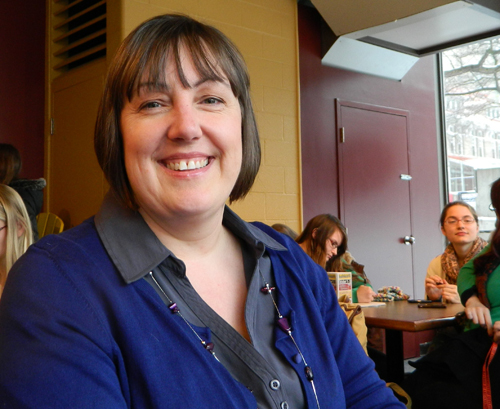
She’s a Guelphite who remembers climbing on the U of G cannon with her sister when they were kids. “My dad was a programmer here, so we kind of grew up on campus,” recalls Prof. Tricia van Rhijn.
Apparently, she enjoyed her visits to the University so much that she enrolled here after high school, completed undergrad and graduate work here and is now a newly appointed professor in the Department of Family Relations and Applied Nutrition. But the long break she took in the middle of that process has influenced van Rhijn’s research in human development and given her a different perspective on the courses she teaches.
Before she completed her undergraduate studies, van Rhijn took 12 years off to raise her two children – and some other children as well. “When they were young, I ran a licensed home child care.” Once her children were older, she decided to return to school. Her original plan was to complete her undergrad and get a teaching degree, but early on she discovered a love for research. “Instead of applying for teacher’s college, I applied for the master’s program.” It was a change of plans she doesn’t regret at all.
In her research, van Rhijn focuses on mature students and students who have their own dependent children. “These students have unique challenges that are not always recognized,” she says. “They may not get much support from their families for being in school, and they feel like they don’t fit in with the other students.”
Many continue working, she adds, and some even continue to work full-time while attending school and parenting their children.
Van Rhijn claims U of G’s Mature Student Association saved her sanity. “I was very active in the organization while I was an undergrad here. It was a place where ‘everybody knows your name’ and, even more important, understands the issues you are dealing with in your life.”
Early on in her PhD work, van Rhijn contacted the Atkinson Centre for Mature and Part-Time Students at York University and developed a collaborative research project with them. They created a three-year survey of mature students at four universities – Guelph, York, Ryerson and Waterloo – with a different focus each year. For her doctoral thesis, van Rhijn took the subset of those students who were parents, giving her about 400 surveys to analyze.
One focus has been the reasons these “student-parents” decide to return to school. “Schools often make assumptions about why students enroll and why they choose a particular school,” she says. Her results found that mature students often report intrinsic reasons for studying. “They’ll say, ‘I’ve always wanted to study this,’ or, ‘It’s been a lifelong dream.’” They also talk about being more personally fulfilled or finding a more fulfilling and meaningful job, and seeing education as the path to that job.
One reason van Rhijn and her fellow researchers hadn’t anticipated was proximity to the school. While students just out of high school are often ready to move around the world to study, students who are parents usually enroll at the nearest university. They don’t want to uproot their children and often continue to work while studying.
Many students expressed a sense of social responsibility related to their own life experiences. “For example,” says van Rhijn, “someone who was helped by a social worker during tough times may decide to become a social worker. They want to give back to the community and see education as the stepping-stone to that.”
Others mentioned having been laid off work or feeling that their jobs were precarious and hoping additional education would make them feel more secure in the future.
Another major focus for the student-parents was the desire to be a good role model for their children. “The literature shows that children whose parents attended university are more likely to go to university themselves,” says van Rhijn, “and many want to show their children that a post-secondary education is attainable.”
Her study also revealed the need for additional supports for mature and parenting students, and strategies to make those supports more accessible. While U of G, like other schools, has many programs and services that would be helpful for those students, the students are often not aware of them. “Because they don’t live in residence, mature students don’t see the posters and flyers that other students might,” explains van Rhijn.
She likes the set-up at York University, where mature students have a separate orientation aimed at their needs and staff who provide consistent services and direction. Student-parents can be challenged by a lack of institutional understanding when they are dealing with conflicts between their home and school lives. For example, says van Rhijn, a student who is sick can get a doctor’s note for an extension on an assignment, but some professors won’t do the same for a student who needs to care for a sick child.
Fortunately, van Rhijn has good memories of the support she received. “My son’s Grade 8 graduation was scheduled for the same time as the final exam in a course I was taking, and I was afraid to ask if I could take it at a different time. I wasn’t sure if that would be an acceptable reason, but dreaded telling my son I wouldn’t be able to go.” The professor agreed to let her take the exam earlier in the day, and van Rhijn made it to his graduation. That’s the kind of flexibility that can make a huge difference to mature students, she says.